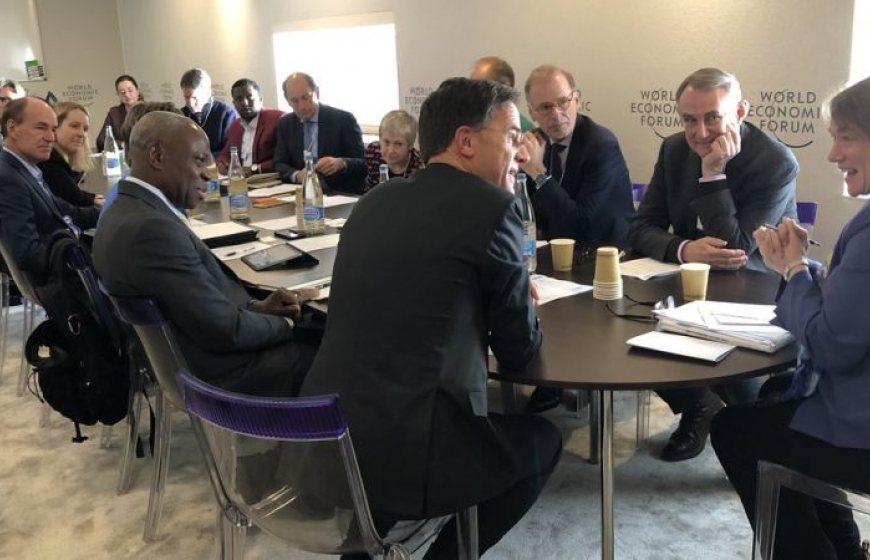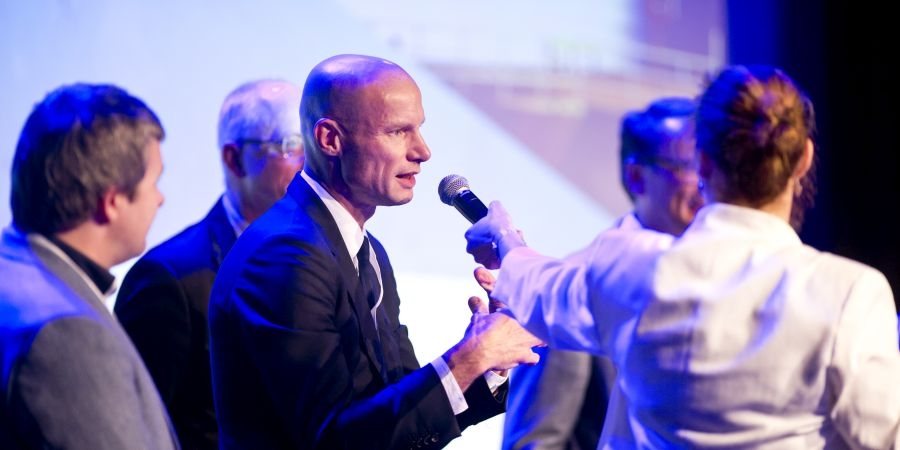
On Thursday 24 January, Dutch Prime Minister Mark Rutte hosted a roundtable on the Valuing Water Initiative during the Annual Meeting of the World Economic Forum in Davos. The public-private initiative will put the recommendations of the High Level Panel on Water into action. Henk Ovink, Special Envoy for International Water Affairs for the Kingdom of the Netherlands, discusses the commitment expressed last week by national governments, international companies and NGOs in his blog.
Rethink using and managing water
“In Davos, CEOs and board members of private, public, civil society and international organisations clearly showed their commitment to rethink using and managing water more sustainably, respect the value of water for all stakeholders and act accordingly. Doing so would lead to wiser investment decisions, better policies and better practices. The sense of urgency is high and is rising – check recent publications by the World Economic Forum (WEF) itself, the Dutch Central Bank and the World Wildlife Fund warning the financial sector about water risks.

Water, the number one risk
We laid the foundation at the WEF three years ago in the presence of the UN Secretary General at the time, Ban Ki-moon, and World Bank President Jim Yong Kim. At the time, WEF stated in its Risk Report that water is the world’s number one risk. In April 2016 the United Nations and the World Bank Group convened a High Level Panel on Water (HLPW), consisting of 11 sitting heads of state and government and one special advisor. The HLPW provided the leadership required to champion a comprehensive, inclusive and collaborative way of developing and managing water resources, and improving water and sanitation related services. The Netherlands was one of the founders of the HLPW, and the Dutch involvement has been considerable with the Dutch Prime Minister, Mark Rutte, as one of the leading heads of state. I had the honour of being one of the Sherpas accompanying him to the HLPW. Watch this short video.
Three tenets
Fast forward to the spring of 2018, when the HLPW presented its action agenda, with three main tenets. One, the water task is enormous, complex and interlinked. To be able to take action that actually has impact, we have to understand that complexity. Two, if we understand water better, we can and must value it comprehensively, taking into account all its values - cultural, social, environmental and economic. We need to protect our sources, invest, innovate and leave no one behind. And three, we need to organise water better. Water needs to be managed inclusively, accountably and transparently in our cities, river basins, countries and across our borders.
The Netherlands led the Valuing Water track during the HLPW. We did not do this alone, but always in partnership and supported by the World Bank Water Practice. Through a global dialogue in all regions of the world and with many stakeholders, we jointly determined five principles of valuing water. These are to: recognise water’s multiple values; build trust; protect the sources; educate to empower; invest and innovate.This work resulted in the establishment of the Valuing Water Initiative, a coalition of governments, businesses, investors and NGOs, determined to put these Valuing Water Principles into practice.
Stronger commitment
This January at WEF in Davos, at the round table spearheaded by our Prime Minister Mark Rutte and CEO of Heineken Jean François van Boxmeer, commitment to valuing water was further strengthened at leadership level. Prime Minister Rutte explicitly asked the other partners to form coalitions within their own networks and embark on peer-to-peer learning and exchange. This would start the much needed ripple effect. Gilbert Houngbo, President of IFAD and chairman of UN Water, announced that Valuing Water will be a central theme in 2021. Laura Tuck, the World Bank’s Vice President for Sustainable Development, embraced the Valuing Water Initiative, endorsed the support through the Water Practice and the World Resources Group 2030 (2030WRG) and emphasised the enormous challenge of water scarcity. The World Bank will involve the HLPW tenets and principles in developing future financing solutions.
Inspiring example
The international business community is already well on its way. Jean-François van Boxmeer talked about Heineken’s corporate water strategy that is informed and inspired by the Valuing Water Principles, and its collaboration with the Dutch government. An inspiring example is Heineken’s brewery in Mexico, an impressive showcase for sustainable and equitable water use, that can be replicated across the sector. Another appealing action is the MoU signed by the government of the Netherlands, Nespresso, Nestlé, the Colombian Coffee Growers Federation (FNC), Solidaridad and Wageningen University in November 2018 to tackle the challenges of water management in the coffee value chain and landscape. Yet another example is that ING's head of Wholesale Banking, Isabel Fernandez, announced that ING will partner the Dutch government in the Valuing Water Initiative for the next three years. At the same time, ING’s global lead for water projects, Ambika Jindal, will be seconded to the Valuing Water Initiative team for the next three years. ING will support the initiative with its network and financial expertise.
The financial sector is also represented by the Ceres Investor Network on Climate Risk and Sustainability. And the very important mining sector joined the initiative as well. WWF showcased their Valuing Rivers approach and reiterated the need and opportunities to be created for the world to join forces and embrace valuing water. We need representatives from agriculture and the urban environment at the table too. Personally, I think it would be great if a group of cities would come aboard in the near future. All the water challenges come together in our cities and hotspots of challenges must become hotspots for opportunities. C40 and 100 Resilient Cities already work closely with us and the Netherlands Water Partnership, expanding their capacity is next.
Towards a water secure world
Concrete action is key for the next steps. In Davos, it was clear that there is strong commitment and that there are promising initiatives among all stakeholders around the world. It is up to all partners to uphold that commitment and to share the message of valuing water across their networks and across the regions where they work. For the Netherlands, it is amazingly valuable to support this work and build a more sustainable and equitable water secure world together.”